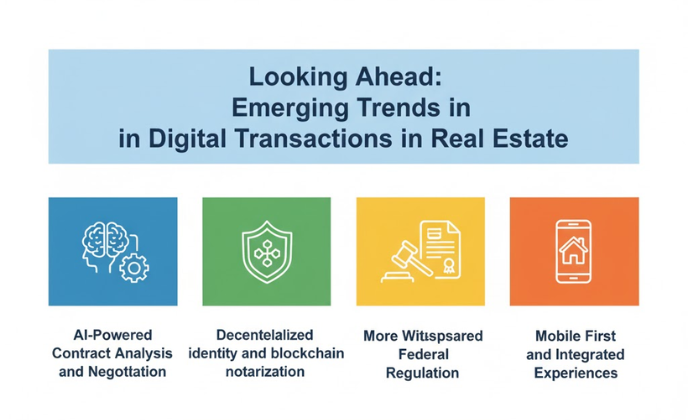E-Signatures for Real Estate: Closing Deals Faster & More Securely with WeSignature

Introduction: The Paperless Revolution Hits Real Estate
Imagine losing a sale because a contract got stuck in overnight mail, or a buyer couldn’t get to the closing table on time. In the competitive real-estate world, the difference between a closed deal and a missed opportunity often comes down to time and trust. That’s why electronic signatures (e-signatures) have moved from novelty to necessity.
By 2026, they will be the most widely used technology among U.S. Realtors, with e-signatures, as 79 % of agents state it’s part of their daily activity. The pandemic expedited the adoption of the digital signature process, and it continues to be the method of choice as it saves time, is more secure, and improves the client experience.
This guide will cover how e-signatures are changing the way real estate transactions close, the legal contexts that uphold them, the benefits for agents and brokers, and lastly, the best practices for implementing WeSignature to close transactions faster and with more security. Whether you are starting a brand new brokerage or have an established business and just want to modernize, this article will help you harness the power of e-signature agreements.
1. Why Real Estate Needs E-Signatures
The urgency of speed and efficiency
Real estate transactions involve multiple contracts, including purchase agreements, disclosures, financing documents, title papers, and closing statements. Traditionally, each document required printing, signing, scanning, and mailing, adding days or even weeks to the closing timeline. Delays aren’t just inconvenient; they can derail deals if buyers lose interest or financing changes.
E-signatures solve this problem by enabling parties to review and sign documents within minutes, regardless of location. Digital signing platforms like WeSignature streamline the process, sending notifications when documents are ready, tracking signatures in real time, and ensuring no page is missed. Faster signatures mean faster closings, happier clients, and more referrals.
Client expectations and remote work
Today’s buyers and sellers expect digital convenience. Remote work has also changed how people buy homes—many purchase property in other cities or states without ever visiting in person. E-signatures enable remote transactions and allow clients to sign from their phone or laptop while traveling or living overseas. This expanded capability develops a market that competes with past local buyers and allows you to minimize in-person meetings.
A market on the rise.
E-signatures are showing no signs of slowing down. Analysts predict that the global e-signature market could surpass USD 20 billion and is fueled primarily by the real estate sector, legal services, and financial transactions, including electronic records, the mortgage process, and closing documents. As part of this, it’s not just agents using digital signing – lenders, title companies, and escrow officers are also making digital signing part of their process. If you recognize and embrace this new reality early, you will be ahead of your competition.
2. Knowing the Legal Framework – ESIGN, UETA, and Remote Notarization
ESIGN Act and UETA
It’s common to think that e-signatures will not hold up in court. But in fact, there is strong protection provided under U.S. legislation in favor of e-signatures.
The Electronic Signatures in Global and National Commerce (ESIGN) Act (2000)provides electronic signature with the same legal standing and enforceability as handwritten signatures as long as: (i) the signer intends to sign their name, (ii) they give them consent to conduct business electronically and (iii) the e-signature is part of a record that is retained in its original condition.
The Uniform Electronic Transactions Act (UETA) (1999) has been adopted by most states and mirrors the provisions of the ESIGN. UETA indicates that a Courts treat digital signatures as authentic as long as you can prove the signer’s intent and keep proper records—features that WeSignature automates with its audit trails.
Remote Online Notarization (RON)
Many real-estate documents still require notarization. Traditionally, notarization meant physical presence; however, state and federal laws have evolved to accommodate remote workflows:
- Virginia became the first state to authorize remote electronic notarization in 2011, allowing notaries to verify identity via audio/video .
- Montana followed in 2015, and Nevada and Texas enacted laws in 2017. Under these laws, signers appear before the notary via video, and the notary’s digital seal is attached to the electronic document.
- By the year 2025, 47 states and the District of Columbia in the United States will have passed permanent legislation regarding remote online notarization. Additionally, states such as California and Massachusetts implemented Remote Online Notarization, or RON, in 2024, and access will now increase nationally. NotaryLive explains that new legislation at the federal level, the SECURE Notarization Act, will allow remote online notarization to become legal across the nation while standardizing the process.
Remote notarization, simply put, means buyers and sellers are not required to meet with a notary in person; they can complete the signing of the entire closing online. In particular, RON is a game-changer for clients who are out-of-state or overseas.
3. Benefits of E-Signatures for Real-Estate Transactions
Speed and Convenience
WeSignature’s workflow enables the documents to be signed in minutes instead of days, which greatly accelerates transactions. The workflow sets reminders, so even during a busy closing period, nothing is missed, and clients have the advantage of a smooth workflow. Time savings equal to additional listings and commissions.
Security and Trust
Real property transactions involve high-value assets, which makes fraud prevention extremely important. E-signature platforms ensure security with encryption, identity verification, and a tamper-evident audit trail. Advanced e-signature solutions verify signer identity, time-stamp every action, and encrypt documents to prevent alteration. This transparent, traceable process builds trust among buyers, sellers, and lenders.
Legal legitimacy and compliance
E-signature service providers comply with ESIGN and UETA regulations and typically meet overseas regulations. Remote notarization regulations apply mainly to notaries, so any signer is able to utilize an online notary regardless of their location. WeSignature accomplishes compliance via electronic consent, providing tamper-proof retention records, and by complying with local regulations.
Lower costs and environmentally friendly
Going paperless saves money and is good for the environment. E-signature eliminates printing costs, courier fees, and storage costs. Digital processes dissolve delays due to lost pages, misplaced contracts, etc, resulting in a more streamlined, predictable process. Reducing paper waste is also in line with sustainability initiatives, which are more important to younger buyers.
Improved client experience
Real estate hinges on relationships. Clients appreciate the convenience of signing documents from any device, anywhere. E-signatures enhance satisfaction and trust by offering fast, transparent signing experiences. For agents, it signals professionalism and a commitment to modern practices.
4. Use Cases: From Listing to Closing
Listing agreements and disclosures
The journey begins with a listing agreement between the seller and the agent. Electronic signatures streamline the listing process by allowing sellers to sign from anywhere. Disclosure forms—lead-based paint, property condition reports, and HOA documents—can all be executed electronically. This ensures compliance while preventing delays caused by missing paperwork.
Purchase contracts and counteroffers
In a competitive market, speed matters. E-signatures allow agents to send offers and counteroffers instantly. Buyers can sign on their phone, and sellers can accept within minutes. Real-time notifications reduce the risk of a buyer losing out because an offer took too long to reach the seller.
Loan documents and lender approvals
Lenders and mortgage brokers use e-signatures to collect financial documents and authorizations. WeSignature integrates with document management systems so borrowers can sign loan applications and disclosures securely. This reduces back-and-forth emails and speeds up underwriting.
Title work and escrow
Title companies send commitment letters, preliminary reports, and closing disclosures electronically. E-signatures ensure each party—buyer, seller, lender—acknowledges receipt and consent. Because documents are time-stamped and securely stored, there’s a clear audit trail for regulators.
Closing statements and deeds
Remote online notarization enables a fully digital closing. The buyer, seller, and notary join in a secure video meeting to review and execute all documents related to the deed and settlement statements. The notary will confirm identity and apply a digital notary seal to the documents. Once completed, all documents are sent electronically to the appropriate county clerk or recorder’s office for recording. Digital closings can reduce closing time by about a week and save lenders money. For lenders with high volumes of closings, digital closings provide even more cost savings.
5. Looking Ahead: Emerging Trends in Digital Transactions in Real Estate

AI-Powered Contract Analysis and Negotiation
Looking past simply collecting signatures, artificial intelligence can now begin to analyze contracts and identify missing clauses, seek out potential risks in a contract, and even offer negotiation ideas. As artificial intelligence tools continue to develop, we can expect that these tools will connect to e-signature platforms to make legal due diligence and compliance check-up e-facility smoother.
Decentralized identity and blockchain notarization
Blockchain technology offers tamper-proof records and decentralized identity verification. Various organizations are looking into “smart contracts” on blockchain, where the contract executes autonomously as conditions are met. While it may be a few years until it is mainstream, the early pilots show that blockchain could increase security and transparency.
More Widespread Federal Regulation
The proposed SECURE Notarization Act would allow notaries across the country to perform the notarization process remotely, establishing consistent standards for this process across state lines. The legislation, if passed, would remove the last barriers to interstate transactions and further develop widespread adoption.
Mobile First and Integrated Experiences
With most buyers starting their home search on their mobile devices, e-signature solutions must be mobile-first. Expect platforms to combine the signing, video notarization, document storage, and payment process into one app. Agents who embrace the tools will deliver an integrated and seamless consumer experience.
Closing Thoughts
The real estate industry is beginning to accept a digital future, and at the core is the use of e-signatures to allow clients to sign on the go, securely and quickly, and from anywhere. E-signatures allow agents to close deals faster, at a lower cost, with higher client satisfaction and a reduction in risk. The legal statutes, ESIGN and UETA, ensure signatures have legal effect, and the movement towards RON across 47 states makes fully digital closings more tangible. As more federal and state legislation is adopted for e-signatures in the real estate process, the cost and time efficiency will make the benefits even more significant.
Frequently Asked Questions
Q: Are e-signatures legal for real-estate contracts?
Yes. The ESIGN Act (2000) and UETA (1999) affirm that electronic signatures have the same legal effect as handwritten signatures, provided signers show intent, consent, and proper record retention.
Q: Do all states allow remote online notarization (RON)?
As of 2025, 47 states and the District of Columbia have enacted permanent RON laws, while a few states offer temporary or pilot programs. California and Massachusetts added RON in 2024. The SECURE Notarization Act aims to create nationwide standards.
Q: Which documents can be signed electronically?
Most real-estate documents—including listing agreements, purchase contracts, leases, disclosures and closing statements—can be signed electronically. Some deeds or estate documents may still require wet signatures depending on local law. Check with your title or escrow provider.
Q: How do e-signature platforms verify identity?
Platforms like WeSignature use multi-factor authentication, government ID checks, knowledge-based questions and video verification (for RON) to confirm signers. Each signature is time-stamped and stored with a tamper-evident audit trail, providing proof of authenticity.
